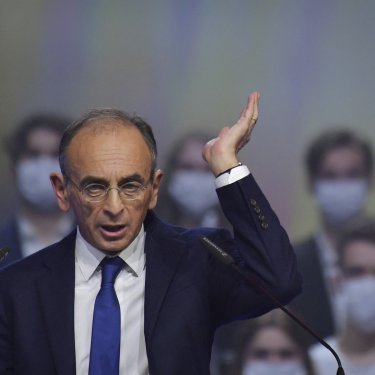French presidential candidate asked to acknowledge, condemn supporters’ violence against reporters

Several journalists were physically attacked or threatened during French presidential candidate Éric Zemmour’s first campaign rally last weekend. Alarmed by the unprecedented violence to which the reporters were subjected, Reporters Without Borders (RSF) calls on Zemmour to acknowledge and condemn these press freedom violations.
In RSF’s view, Zemmour’s failure to recognise the seriousness of the incidents involving several journalists during his rally at an exhibition centre in Villepinte, in northern Paris, on 5 December and his refusal to condemn them pose a threat to democracy.
“This level of violence against reporters during an election campaign is appalling,” RSF secretary-general Christophe Deloire said. “It would be shocking if candidates and activists were to assume the right to choose the journalists they like and to expel the others, amid shouts and beatings. Candidates who fail to ensure that press freedom is respected during their meetings must bear the responsibility. We urge Eric Zemmour to recognize the gravity of what happened and to undertake to ensure that journalists can cover his political meetings. It is the least you can expect, especially from a former journalist.”
Célia Mebroukine and Armel Baudet, two reporters working for the Médiapart news website’s daily broadcast “A l’air libre,” were hit over the head, threatened and insulted during the rally. A crew working for the TMC television programme “Quotidien” had to be escorted out of the exhibition centre by the candidate’s security service while rally participants chanted, “Everyone hates Quotidien.” Paul Larrouturou, a reporter for the TV news channel LCI, said a man wearing a Zemmour campaign T-shirt threated to kill him as he was standing just a metres from the candidate. While outside the exhibition centre, AbacaPress agency photographer Eliot Blondet was jostled by a Zemmour supporter, who told him: “I no longer forgive, I kill.”
Disregarding what these journalists have reported, Zemmour spokesman Dénis Cieslik insisted yesterday that “no journalist was physically attacked” during the rally. He also said he was not “astonished” by the hate for “Quotidien” because Zemmour supporters “are mistreated” by the programme. His comments are similar to those of the candidate himself, who has accused “activist journalists” of seeking his “social death” and of “stealing democracy.”
During the rally in Villepinte, Zemmour said he was, “the only one to defend freedom of thought, freedom of speech, the freedom to debate, the freedom to put words to reality, while they all dream of banning our meetings.” But he paradoxically supports sanctions against media whose editorial policies are not to his liking. On 12 November, his staff barred journalists with the newspaper Sud-Ouest from a public meeting in Bordeaux, citing the newspaper’s treatment of Zemmour as grounds for this decision.
Zemmour wants to abolish France’s household TV and radio tax, the main source of income for the public broadcast media, which in October he accused of being “in the service of an ideology that detests France” and of “spitting on the French people.” He made these comments shortly after a “joke” at an international security trade fair in which he pointed a gun at journalists.
Last weekend’s violence follows a disturbing increase in threats during the past year against journalists covering the Zemmour campaign and the far-right in general in France. Last week, Médiapart filed a complaint about the massive online dissemination of eight videos in which three of its journalists are threatened with rape and murder. The news site StreetPress had to protect the entrance to its headquarters with an armour-plated door last month after its editor, Mathieu Molard, was the target of a social media harassment campaign and calls for his murder.
After the journalist Mourad Guichard wrote a story about identity politics in Orléans for the website Magcentre.fr, a far-right activist tried to intimidate him by going to his home. In the same central region, France Télévisions was forced to request police protection for its regional director, who received death threats from individuals linked to the far right earlier this year after he instructed France 3 Centre-Val de Loire not to broadcast a film about Jeanne d’Arc made by the Orléans city hall on the grounds that it had professional and ethical flaws.
France is ranked 34th out of 180 countries in RSF's 2021 World Press Freedom Index.



